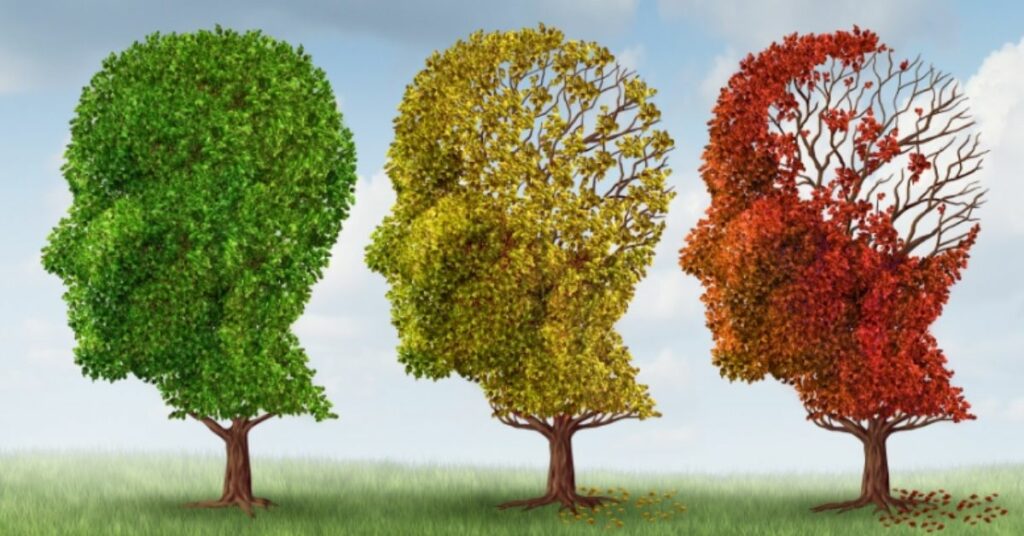Aging and mental health
Reviewed by Mary T. Johnson, RN, MSN

Aging affects our health not only physically, but also mentally and emotionally. As we age, we encounter new stages of life associated with new opportunities and challenges. How we respond to these developments is determined by a number of factors, including our past experiences.


Our perception of self also changes depending on our age. Certain physical and mental experiences are nearly universal and are associated with specific stages of life. Puberty, for example, changes everyone physically and mentally during late childhood or early adolescence. As such, mental health challenges may be more likely to develop at certain stages of life.
How Does Age Affect Mental Health?
Our mental health is informed from a variety of sources, including:
- Genetics
- Biochemistry
- Life experiences
- Past trauma
We are born with certain genetics, but the other factors listed above may develop or change as we age. Everyone gathers new life experiences as time goes on, some of which may be traumatic. Even our brain chemistry can change due to traumatic brain injury (TBI), adverse effects of certain medication, or the onset of dementia.
Does Mental Health Get Worse with Age?
It’s a common misconception that mental health is destined to deteriorate with age. In fact, the relationship between age and mental health is not linear in either direction. This means that as you get older, it is not necessarily more likely that your mental health will either improve or worsen.
According to the Centers for Disease Control and Prevention (CDC)1, “Most older adults are experiencing the life satisfaction, social and emotional support, and good mental health that are essential to healthy aging.” Aging is not an inherent detriment to mental health. In fact, some conditions may improve with age.
Mental Health as You Age
There are certain mental health conditions that may be more likely to develop during specific stages of life than others. Additionally, experiences commonly associated with specific ages may also be correlated with mental health problems as well as improvements. Let’s take a look at what you can expect to encounter with your mental health at any age.
Childhood
Childhood is full of trial and error, exploration, and discovery. Children need these experiences to find themselves and grow into healthy, confident adults. However, some parts of childhood may increase children’s risk for developing mental health conditions, such as:
- Trauma: Abuse, neglect, loss, and grief can affect people of any age, but children are especially vulnerable to trauma. Childhood trauma in particular can leave scars that follow children well into adulthood.
- Instability: Children are dependent on their parents for a safe, stable environment. As such, they are at a greater risk for the stress associated with instability and poverty. In fact, about one-third of all people living in poverty are children2.
- Bullying: Because children are still discovering themselves, their self-esteem is at its lowest during childhood. This makes them particularly susceptible to bullying from their peers, which can also contribute to lower self-esteem.
Studies show that certain mental health disorders are more likely to develop during childhood than later in life, including:
- Attention-deficit/hyperactivity disorder (ADHD)
- Autism spectrum disorder (ASD)
- Anxiety
- Depression
- Oppositional defiant disorder (ODD)
- Conduct disorder
Adolescence
Teenagers face a lot of pressure from parents, teachers, and peers. School work, relationships, first jobs, college interviews, and other factors may influence their mental health. High levels of stress can increase teens’ risks for developing mental health disorders, such as:
- Addiction: Many people begin experimenting with addictive substances during adolescence. According to the American Cancer Society3, about nine out of 10 smokers started smoking before they turned 18, and almost all started before age 26. Teens may begin to abuse or become addicted to alcohol, prescription drugs, opioids, and other illegal substances.
- Depression: Depression is the most common mental health disorder among adolescents. It is usually characterized by anger, extreme sadness, and melancholic mood. Other mood disorders, such as bipolar disorder, also tend to be diagnosed in adolescence.
- Anxiety: Anxiety disorders are the second most common mental disorder for teens, ranging from generalized anxiety disorder (GAD), panic disorder, eating disorders, and obsessive-compulsive disorder (OCD).
By adolescence, some teens may develop mental health disorders in reaction to their experience of childhood trauma, such as posttraumatic stress disorder (PTSD) and dissociation/derealization.
Young Adulthood
Transitioning into adulthood is a critical stage in the development of identity and self-concept. Young adulthood encompasses a variety of first-time experiences in a variety of areas of life, including:
- Career: Many young adults graduate from college and enter the workforce full-time for the first time. Even those who do not attend college may be taking on greater responsibilities in their workplaces at this age.
- Domesticity: Most people move out of their parents’ homes in their late teens or twenties. They may be cooking, cleaning, working, and taking care of themselves for the first time.
- Relationships: Many young adults have their first serious relationship at this stage of life. Some young adults move in together for the first time; others may get married. Many young adults may struggle to make friends for the first time out of the context of a school environment.
- parenthood: Some people experience parenthood for the first time in young adulthood. Taking care of an infant or child comes with its own rewards and stresses.
- Homeownership: Some young adults may experience homeownership in their twenties and early thirties.
Many of these life changes come with an increased risk of stress, anxiety, depression, and other mental health conditions. Pregnancy and parenthood, for example, are associated with increased risk for perinatal mood and anxiety disorders (PMADs), insomnia, and disordered eating. Additionally, young adulthood is typically the season in which certain mental health disorders may finally be diagnosed even if they were present earlier in life, such as schizophrenia, ADHD, bipolar disorder, and personality disorders.
Middle Age
Middle age can be a great period of increased emotional and mental stability for many people. According to a CDC survey4, nearly 95% of people aged 50 or older reported that they were either satisfied or very satisfied with their lives. Still, it’s important to note that the World Health Organization (WHO)5 estimates around 15% of adults aged 60 or older suffer from a mental health disorder.
Middle age comes with its own set of life stressors, such as:
- Children graduating from school and/or moving out
- Taking care of aging parents
- Struggling with romantic relationships or going through a divorce
- Adjusting to the reality of having a middle-aged body
- Having a midlife crisis
- Struggling with physical health or adjusting to a newly developed disability
- Worrying about saving enough for retirement
- Struggling with career satisfaction
With the right support systems in place, many middle-aged people are able to adjust to these new realities. However, it’s important to acknowledge that the stressors in this stage of life can be overwhelming. 80% of deaths6 by suicide in the U.S. involve people aged 45–54.
Senior/Retirement Age
It’s easy to forget that mental health is physical health—that the brain is in fact a bodily organ and will deteriorate with age, just like everything else. These physical changes to our brains can have an effect on our mental and emotional well-being.
Although some people may feel these effects earlier than others, most people begin to experience at least some changes by the time they reach retirement age. Seniors may experience decreased capacity7 in:
- Memory and recall
- Speech and communication
- Focus and attention
- Multitasking
- Learning new things
Some seniors experience difficulty with transitioning out of the workforce and into retirement. They may struggle after the loss of a spouse, family member, or loved one. Such experiences can increase their risk for depression and grief. Suicide rates are highest in the U.S. among men aged 85 and older with isolation and access to more lethal means acting as contributing risk factors.
Is Dementia a Normal Part of Aging?
While forgetfulness is a normal part of aging, dementia is not. Many people grow old and still retain their memories. They may remain independent and take care of themselves for the rest of their lives. Only in some cases do elderly people develop dementia and become completely dependent on others for everyday care and support.
End of Life
It can be difficult to face the end of one’s life. The elderly may struggle with depression, grief, loneliness, and suicidal ideation. They may experience increased anxiety and stress as they worry about what will happen to their families after they are gone. Care providers, spiritual leaders, and family members can help make the end of a loved one’s life more peaceful by offering their love and support.
Physical Health & Mental Health
All aspects of health and wellness are connected. Having a chronic physical illness may increase a person’s risk for poor mental health, and vice-versa. This phenomenon is often referred to as the mind-body connection.
How Does Physical Health Affect Mental Health?
Your physical health can improve or deteriorate your mental health. For example, exercise is known to reduce stress, improve cognitive function, and increase self-esteem. Eating healthy and getting enough sleep also encourage good mental health.
Neglecting to take care of your physical health can result in stress, irritability, and mental fog that can lead to more serious mental health disorders, such as anxiety and depression. Choosing to maintain your physical health can increase your chances for better mental health as you age.
How to Maintain Mental Health as You Age
You can maintain your mental health as you age by engaging in various practices and activities, such as:
- Engaging your brain regularly with books, puzzles, and other cognitive activities
- Processing your emotional experiences in healthy ways
- Learning stress management skills
- Practicing self-care
- Eating nutritious foods
- Exercising regularly
- Getting enough sleep
- Taking time to rest and relax
- Spending time with loved ones
- Learning a new skill or hobby
- Seeing your doctor for regular physical and mental health check-ups
- Seeking professional treatment to address any mental health issues
You can enjoy great mental health as you age. Invest in your long-term mental health by browsing our directory to find a therapist near you.

Sources
- https://www.cdc.gov/aging/pdf/mental_health.pdf
- https://www.americanprogress.org/issues/poverty/reports/2021/01/12/494506/basic-facts-children-poverty/
- https://www.cancer.org/healthy/stay-away-from-tobacco/why-people-start-using-tobacco.html
- https://www.cdc.gov/aging/pdf/mental_health.pdf
- https://www.who.int/news-room/fact-sheets/detail/mental-health-of-older-adults
- https://www.samhsa.gov/suicide/at-risk
- https://www.nia.nih.gov/health/how-aging-brain-affects-thinking
About the author
The editorial team at therapist.com works with the world’s leading clinical experts to bring you accessible, insightful information about mental health topics and trends.
Related articles

Gray divorce: What to do when your marriage ends later in life
When you end a marriage later in life, it’s common to feel scared, anxious...

What happens after an Alzheimer’s diagnosis
A diagnosis of Alzheimer’s starts an invisible clock for both the person who...

Dementia: Signs, types, causes, treatment
Dementia is a group of neurologic symptoms characterized by a steady decline in...

Ageism and social taboos have led many therapists to avoid talking about sex...
